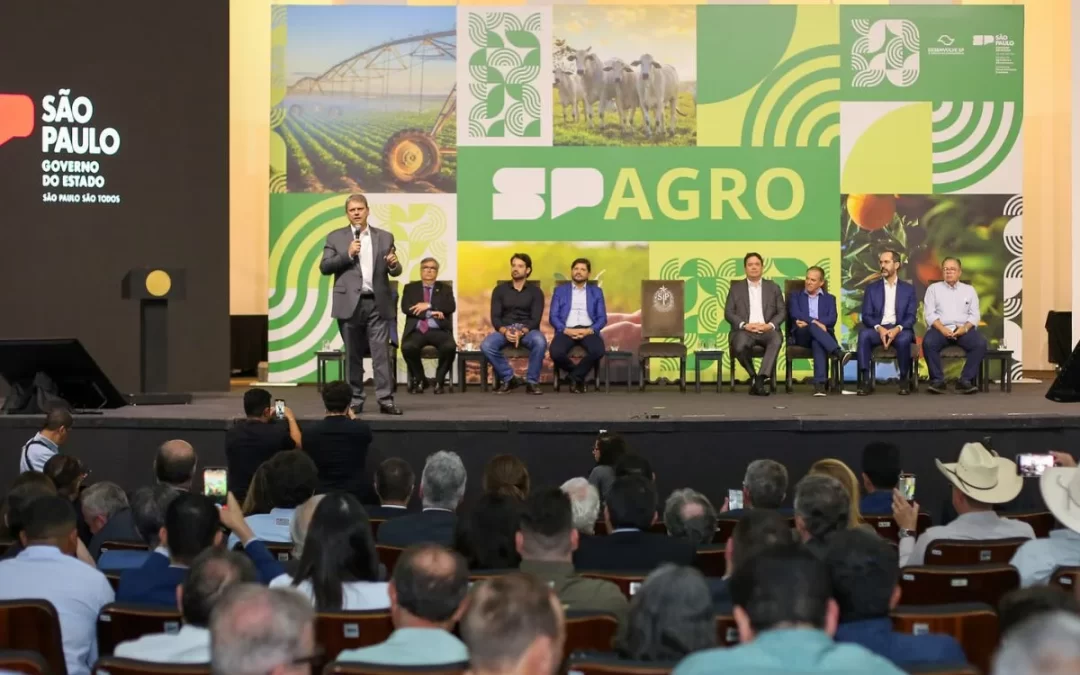The goal is to expand the irrigated area in the state of São Paulo from 7% to 15% by 2030
On Thursday, the 12th, the government of the state of São Paulo announced an investment package for agribusiness in São Paulo. Together, the resources total R$340 million in investments. The action is part of an agreement between the secretariats of Agriculture and Supply (SAA), Economic Development and Desenvolve SP — the state’s development agency that finances the development of small and medium-sized companies, as well as municipalities.
Among the main actions is the announcement of a R$200 million credit line to expand irrigation through the Irriga +SP program. Interest rates will start at 4.8% per year, with a repayment term of up to five years. For financing irrigation, photovoltaic energy and precision agriculture projects, the grace period is up to 18 months. For financing the acquisition of machinery and equipment, the grace period is 12 months.
Small producers with an area of up to 100 hectares and medium producers with between 100 and 500 hectares will be able to access the credit. The financing limit is up to R$5 million. With this initiative, the state government intends to increase the current 7% of irrigated area in São Paulo to 15% by 2030.
Recalling the fires that caused billions in losses to the agricultural sector in São Paulo this year, Governor Tarcísio de Freitas stressed that this credit is essential. “We need pivots, irrigation and storage facilities, with lower interest rates than those practiced in the market,” he said during a ceremony at Palácio dos Bandeirantes.
In addition, SAA is working on another initiative to reserve water for agricultural interests. “I am working on a bill to pass to Alesp [the Legislative Assembly of the state of São Paulo], because we are going to reserve water in São Paulo,” said Guilherme Piai, secretary of SAA.
Combating greening
Another announcement was the direct investment of R$90 million to create the Center for Applied Research in Innovation and Sustainability (CPA). The initiative is a partnership between Fundecitrus, the São Paulo State Research Support Foundation and the Luiz de Queiroz College of Agriculture. The main objective of the CPA will be to develop research to combat greening.
At the time, Freitas recalled that the disease decimated about 20% of the orange groves in Florida last year, something that, according to him, will not happen in São Paulo. “We cannot let this happen because we need to remember that 7 out of every 10 glasses of juice consumed in the world are from São Paulo. We are going to respond [to the disease],” Tarcísio highlighted.
Currently, citrus farming accounts for 8.2% of São Paulo’s exports and 45,000 jobs in the state.
Investments in logistics
The investment of R$50 million from the Agroindustrial Production Chain Investment Fund (Fiagro) was also announced — the first Fiagro in the state focused on logistics. The funds will come from Desenvolve SP and will be earmarked for the logistics infrastructure of São Paulo’s agribusiness.
CAR number 100,000
During the ceremony, Governor Tarcísio and Secretary Guilherme Piai symbolically delivered the 100,000th Rural Environmental Registry (CAR). Producer Manoel Marinho Júnior, from Presidente Venceslau (SP), was the one who received the registration.
Producer Manoel Marinho Júnior receives the symbolic delivery of CAR number 100,000 from the state of São Paulo. Photo: São Paulo state government/Disclosure
São Paulo currently has 400,000 properties and the government expects to have 100% of them validated in the CAR by the end of 2026.

